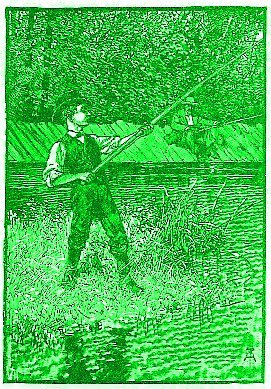|
XI. The Fish I Didn't Catch
(Whittier)
John Greenleaf Whittier was born near Haverhill, Mass., in 1807, and
died at Hampton Falls, N.H., in 1892. His boyhood was passed on a farm,
and he never received a classical education. In 1829 he edited a newspaper
in Boston. In the following year he removed to Hartford, Conn., to assume
a similar position. In 1836 he edited an antislavery paper in Philadelphia.
In 1810 he removed to Amesbury, Mass. Mr. Whittier's parents were Friends,
and he always held to the same faith. He wrote extensively both in prose
and verse. As a poet, he ranked among those most highly esteemed and honored
by his countrymen. "Snow Bound" is one of the longest and best of his poems.
1. OUR bachelor uncle who lived with us was a quiet, genial man, much
given to hunting and fishing; and it was one of the pleasures of our
young
life to accompany him on his expeditions to Great Hill, Brandy brow
Woods, the
64 ECLECTIC SERIES.
Pond, and, best of all, to the Country Brook. We were quite
willing to work hard. in the cornfield or the haying lot to finish
the
necessary day's labor in season for an afternoon stroll through
the woods and along the brook. side.
2. I remember my first fishing excursion as if it were but
yesterday. I have been happy many times in my life, but never
more intensely so than when I received that first fishing pole from
my uncle's hand, and trudged off with him through the woods
and meadows. It was a still, sweet day of early summer; the long
afternoon shadows of the trees lay cool across our path; the
leaves seemed greener, the flowers brighter, the birds merrier,
than ever before.
3. My uncle, who knew by long experience where were the best
haunts of pickerel, considerately placed me at the most favorable
point. I threw out my line as I had so often seen others, and.
waited anxiously for a bite, moving the bait in rapid jerks on the
surface of the water in imitation of the leap of a frog. Nothing
came of it. "Try again," said my uncle. Suddenly the bait sank
out of sight. "Now for it," thought I; "here is a fish at last."
4. I made a strong pull, and brought up a tangle of weeds. Again
and. again I cast out my line with aching arms, and drew it back
empty. I looked at my uncle appealingly. "Try once more," he
said; "we fishermen must have patience."
5. Suddenly something tugged at my line, and swept off with it
into deep water. Jerking it up, I saw a fine pickerel wriggling in
the sun. "Uncle!" I cried, looking back in uncontrollable
excitement, "I've got a fish! Not yet," said my uncle. As he spoke
there was splash in the water; I caught the arrowy gleam of a
seared fish shooting into the middle of the stream, my hook hung
empty from the line. I had lost my prize.
 6. We are apt to speak of the sorrows of childhood as trifles in
6. We are apt to speak of the sorrows of childhood as trifles in
comparison with those of grown up people; but we may depend
upon it the young folks don't agree with us. Our griefs, modified
and restrained by reason, ex-
66 ECLECTIC SERIES.
perience, and self respect, keep the proprieties, and, if possible,
avoid
a scene; but the sorrow of childhood, unreasoning and all absorbing,
is a
complete abandonment to the passion. The doll's nose is broken, and
the
world breaks up with it; the marble rolls out of sight, and the solid
globe
rolls off with the marble.
7. So, overcome with my great and bitter disappointment, I sat down
on the nearest hassock, and for a time refused to be comforted, even
by
my uncle's assurance that there were more fish in the brook. He refitted
my bait, and, putting the pole again in my hands, told me to try my
luck
once more.
8. "But remember, boy," he said, with his shrewd smile, "never brag
of
catching a fish until he is on dry ground. I've seen older folks doing
that
in more ways than one, and so making fools of themselves. It's no use
to
boast of anything until it's done, nor then, either, for it speaks
for
itself."
9. How often since I have been reminded of the fish that I did not catch.
When I hear people boasting of a work as yet undone, and trying to
anticipate the: credit which belongs only to actual achievement, I
call to
mind that scene by the brookside, and the wise caution of my uncle
in
that particular instance takes the form of a proverb of universal
application: "NEVER BRAG OF YOUR FISH BEFORE YOU CATCH HIM."
DEFINITIONS 1. Genial, cheerful. 3. Haunts, places, frequently visited.
Con sid'er ate ly, with due regard to others, kindly thoughtful. 4.
Ap pealing
ly, as though asking for aid. 6. Modified, qualified, lessened. Pro
prieties, fixed customs or rules of conduct. Ab sorbing, engaging the
attention entirely. 1. Hassock, a raised mound of turf. 9. An ticipate,
to
take before the proper time A chievement, performance, deed
The text and graphics of this reader were scanned for
this site
by John Bradshaw in Sydney, Australia.
[Used in KISS Workbooks, Grade
Six, September 10]
|
